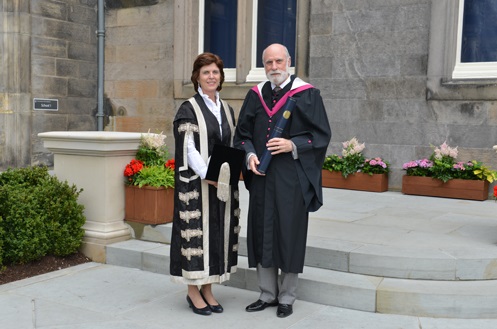Laureation address: Dr Vinton Cerf

Laureation by Professor Saleem Bhatti
School of Computer Science
Vice-Chancellor, it is my privilege to present Dr Vinton Cerf for the degree of Doctor of Science, honoris causa.
The internet is mankind’s largest and most complex creation. It spans national boundaries and puts global communication at the fingertips of the world’s citizens. It is, in today’s world, difficult to imagine life without the information and many services that are available to us all through the internet. However, it is an invention of our time. Dr Cerf was directly involved in the design and implementation of the protocols and software that were used by the first computers that were connected together to form the ARPANET, as the internet was then called.
In 1970, while Dr Cerf was studying for his Masters degree at UCLA, he wrote the communication protocol to be used on the ARPANET, a computer network from which the internet was spawned. The mode of communication to be used – discrete packets of information – had been discussed by other researchers, but had not been tested on a wide area network. After the success with the first nodes connected to the ARPANET, Dr Cerf completed his PhD at Stanford in 1972, and stayed on as an Assistant Professor. He continued to ponder his idea of a network that was based on forwarding of packets of information. In 1973, Dr Bob Khan, who was working on the hardware architecture of the ARPANET, approached Dr Cerf to develop the ARPANET further into an interconnected network of networks – the internet. In 1974, Khan and Cerf outlined their ideas in a seminal paper, and then in 1976 created the original specification of the Internet Protocol and the Transmission Control Protocol, which form the basis of today’s internet. Since then Dr Cerf has moved into industry but has remained actively involved in developing the internet. In 1992, with Dr Khan, he formed the Internet Society, ‘the world’s trusted independent source of leadership for internet policy, technology standards, and future development.’
In recognition of Dr Cerf’s contribution, he has been given many awards, including the Turing Award (computing’s equivalent of a Nobel Prize), the US Presidential Medal of Freedom, and the Queen Elizabeth Prize for Engineering, amongst many others. He has also been elected as a Fellow of the Institute of Electrical and Electronic Engineers, a Fellow of the Association for Computing Machinery, and a Distinguished Fellow of the British Computer Society.
This global recognition of Dr Cerf’s key role has only served to further his zeal in developing the internet. This is especially so in encouraging its use and making it accessible for all. For example, Dr Cerf has been a strong proponent of women in computing; he has spoken out in favour of supporting security and privacy for all citizens using the internet; and he continues to champion open access to the internet for all.
Looking to the future, it is clear that the internet will enable vital functions and services in our increasingly crowded and resource-constrained planet. While the reach of services and information globally is important, it is especially vital in developing regions of the world, where audio and video communication over the internet can bring services and information to those regions that are remote, or where literacy and numeracy remains low. Such services as providing new ways of delivering healthcare; offering education and information in remote areas; and providing a greater access to governance: all these improve the quality of life for citizens.
Easy and accessible internet communication is also seen as an empowering service for the citizens of the world. People can communicate with ease in minutes from devices they carry in their pockets; they can organise and coordinate across continents; and they can implement change in their own lives, as well as help to support and improve the lives of others, through the internet.
In 2002, Dr Cerf wrote, ‘The internet is for everyone. How easy to say – how hard to achieve!’ Indeed, we are all aware, through the many news stories that are in the public sphere, of the great challenges, both technical and non-technical, that present themselves, as the use of the internet grows globally. However, Dr Cerf remains actively committed to addressing these challenges and making sure that the internet is truly for everyone, now and in the future.
Vice-Chancellor, in recognition of his major contribution to the creation and ongoing development of the internet for everyone, I invite you to confer on Dr Vinton Cerf the degree of Doctor of Science, honoris causa.
Category Awards